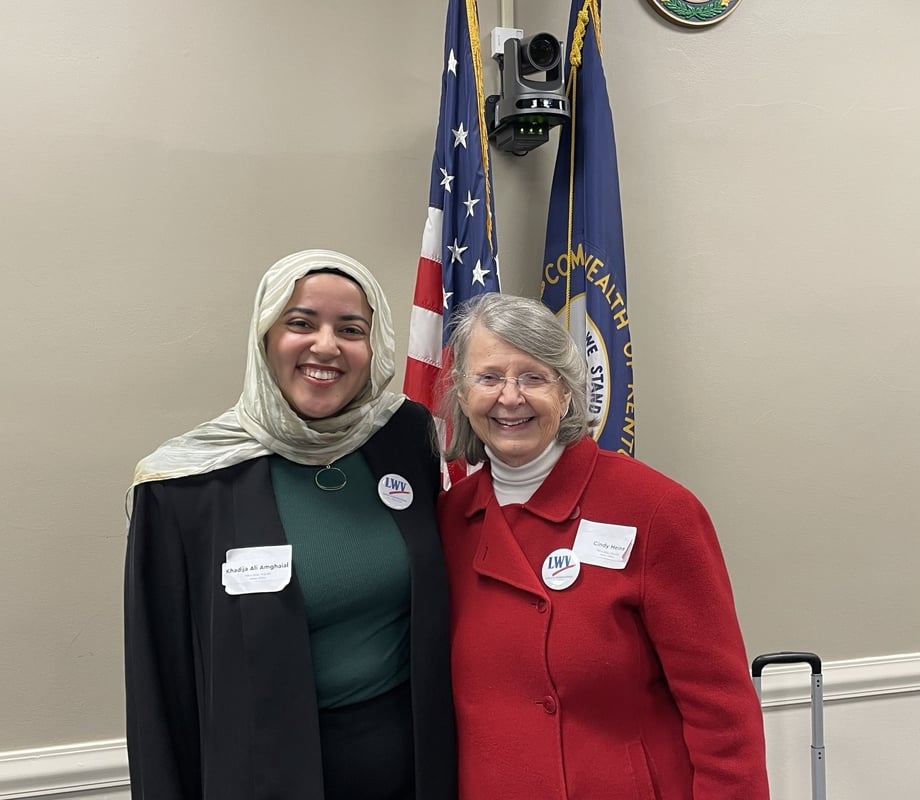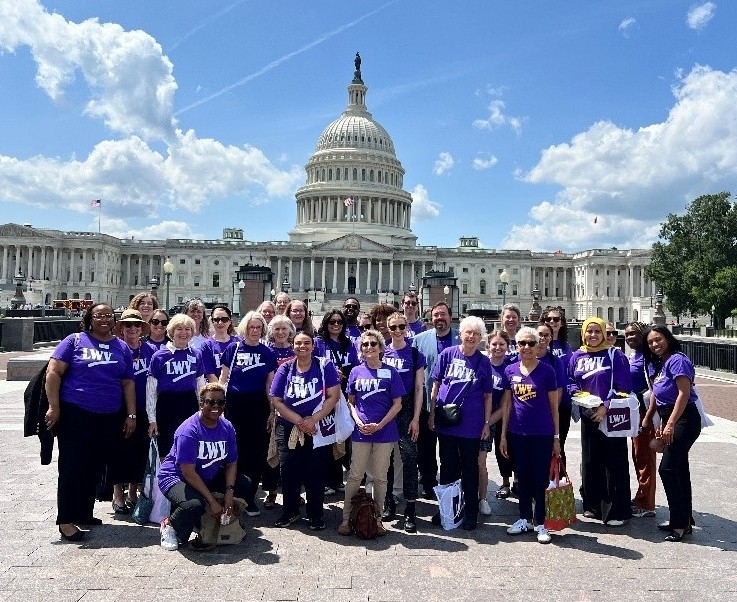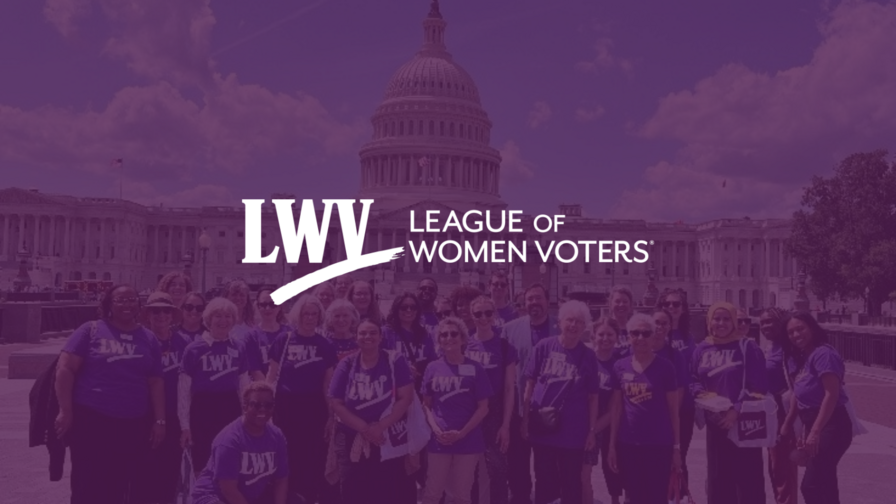Staying True to Nonpartisanship in a Divisive Political Climate
At our core, nonpartisanship is not just a policy — it’s a bedrock principle that defines who we are at the League of Women Voters. As a membership organization committed to empowering voters and defending democracy, we do not support or oppose political parties or candidates. Our focus has always been, and will continue to be, on the issues that matter to our communities: ensuring fair elections, protecting voting rights, and strengthening our democratic institutions.
In today’s increasingly polarized political environment, however, questions sometimes arise about what nonpartisanship truly means, especially during election season and once officials are in office. It’s important to clarify how we approach nonpartisanship across both contexts:
Stay Updated
Keep up with the League. Receive emails to your inbox!
Nonpartisanship During Election Cycles
When candidates are running for office, our nonpartisan remains clear: we do not endorse or oppose any candidate or political party.
Through our state and local voter guides and VOTE411.org, Leagues work tirelessly to solicit and gather answers from tens of thousands of candidates around critical community questions. For example, questions about voting rights, climate change, reproductive rights, climate and resource management, and a wide variety of topics help voters decide which candidate reflects their values and community needs.
By providing voters with information on where candidates stand on key issues, hosting nonpartisan forums, and working to ensure every eligible voter has access to the ballot, LWV's goal is to empower voters with facts, not to tell them who to vote for.
Nonpartisanship With Elected Officials
Once individuals are elected, they are no longer just candidates — they are public servants, responsible for representing all their constituents, regardless of party. Holding elected officials accountable to the public interest is not a partisan act; it is a vital function of a healthy democracy. When we advocate for or against policies based on our mission and values, we do so from our commitment to issues and strengthening civil institutions, not out of allegiance to any political party.
But the reality is that sometimes there are nuances when dealing with elected officials.

With Incumbents Running for Re-Election
Nonpartisanship becomes more complex when an elected official is also a candidate running for re-election. In those moments, we remain focused on their dual roles — as public servants accountable to all constituents and as political candidates subject to the same rules of fair campaigning.
As a nonpartisan organization, the League continues to advocate on issues with those in office, regardless of their campaign status, while not showing favoritism or opposition related to their candidacy. We do not evaluate or engage with them based on their political campaigns but on their actions in the office as they relate to our mission. Our credibility rests on this distinction, allowing us to stay engaged, issue-focused, and firmly nonpartisan even when election dynamics are in play.
On the topic of election administration, LWV recognizes that election administrators can belong to parties across the political spectrum. In our nonpartisan capacity, Leagues interact with election administrators to provide critical updates and insights on how election administration works, based on our long-standing nonpartisan expertise and our on-the-ground election observation programs. Overall, we are pushing for action on voting rights, democracy protection, and other key areas without favor or bias.
Handling Invitations to Incumbents Running for Re-Election
Whether a League invites an elected official running for re-election to an event depends on the context, the purpose of the event, and how the invitation is handled. For example, if the event is issue-focused (e.g., voting rights forum, civic education event, or a panel discussion) then yes, an incumbent may be invited. Still, Leagues proceed with caution and ensure that:
- The official is invited in their official capacity as an officeholder, not as a candidate;
- The event does not coincide with campaign activities or serve as a platform to promote the individual’s re-election; and
- The event is balanced — either by including other elected officials or viewpoints or by being open to the public and clearly non-campaign in nature.
If the event is close to an election or in a heightened campaign period, it’s especially important to ensure all candidates have the same opportunities. Leagues consider:
- If any candidate is invited, all viable candidates for that office must be given the same opportunity; or
- If it’s not feasible or appropriate to invite others (e.g., it’s a single-speaker event), the organization may choose to postpone or avoid inviting the incumbent.
The bottom line is that when Leagues invite incumbents, they do so thoughtfully and equitably, with clear boundaries and rich context.

We are Nonpartisan, Not Neutral
Remaining nonpartisan does not mean staying silent. When democracy itself is under threat, voter access is restricted, or misinformation spreads, the League has a responsibility to speak out clearly and forcefully. Our nonpartisan commitment means the League acts based on our policies and principles, not because of political parties.
We advocate for fundamental rights and freedoms regardless of which political party is in power or which officials are responsible. Focusing on our issues, not affiliations, strengthens our voice and credibility. We hold true to our mission without being beholden to any political agenda.
Why Nonpartisanship Matters
In times of division, maintaining our nonpartisan identity helps build trust across communities. It ensures that we remain a credible, reliable voice for voters — all voters. It positions the League to lead efforts that transcend political divides, focused on the American and moral ideals that unite us rather than the partisan battles that seek to divide us.
Nonpartisanship requires care, consideration, and balance, especially when political tensions are high. But it is essential. It is what makes the League’s work powerful, resilient, and enduring. And it will continue to guide us as we navigate the challenges ahead together.
The Latest from the League
We decided to zoom in on the experiences of one of our volunteers, Cori Edgerton. Cori is a voter engagement volunteer for the League of Women Voters of the Red River Valley (North Dakota). A local university library technician, she hosted her League's first-ever National Voter Registration Day event, leads its Diversity, Equity, and Inclusion (DEI) book club, creates its bimonthly newsletter, participates in its election observation program, and assists with voter outreach. She also supports data collection for North Dakota’s VOTE411 voter guide.
Read on for more about her volunteer advice, thoughts about the connection between Leagues and libraries, and DEI book suggestions!
On January 20, Inauguration Day, the next president and vice president of the United States will be sworn into office in front of the US Capitol Building. As part of the peaceful transfer of power, the two men will recite their Oaths of Office, swearing to protect and defend the US Constitution and to enact their duties faithfully.
As our democracy anticipates unprecedented challenges, there could be no better time to pledge our own oath to protect and preserve democracy. Here’s ours.
LWVUS wrote to Sen. McConnell and Sen. Schumer urging them to reject movement on policies that would have wide-ranging and detrimental impacts on nonprofit organizations across the political spectrum.
Sign Up For Email
Keep up with the League. Receive emails to your inbox!
Donate to support our work
to empower voters and defend democracy.





